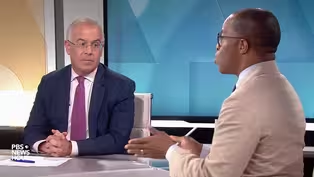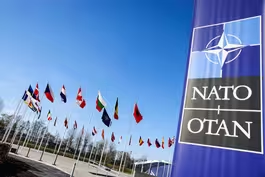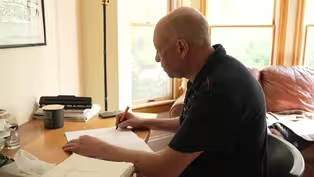
U.S. decision to give Ukraine cluster bombs sparks concerns
Clip: 7/7/2023 | 9m 26sVideo has Closed Captions
Why the U.S. decision to give Ukraine cluster bombs has sparked concerns
President Biden's decision to send cluster munitions to Ukraine in its fight against Russia has sparked concerns from NATO allies and an outcry from human rights activists who say it's a mistake. More than 120 countries have signed a convention banning cluster bombs and U.S. leaders debated the issue for months. Amna Nawaz discussed the development with William Taylor and Marc Garlasco.
Problems playing video? | Closed Captioning Feedback
Problems playing video? | Closed Captioning Feedback
Major corporate funding for the PBS News Hour is provided by BDO, BNSF, Consumer Cellular, American Cruise Lines, and Raymond James. Funding for the PBS NewsHour Weekend is provided by...

U.S. decision to give Ukraine cluster bombs sparks concerns
Clip: 7/7/2023 | 9m 26sVideo has Closed Captions
President Biden's decision to send cluster munitions to Ukraine in its fight against Russia has sparked concerns from NATO allies and an outcry from human rights activists who say it's a mistake. More than 120 countries have signed a convention banning cluster bombs and U.S. leaders debated the issue for months. Amna Nawaz discussed the development with William Taylor and Marc Garlasco.
Problems playing video? | Closed Captioning Feedback
How to Watch PBS News Hour
PBS News Hour is available to stream on pbs.org and the free PBS App, available on iPhone, Apple TV, Android TV, Android smartphones, Amazon Fire TV, Amazon Fire Tablet, Roku, Samsung Smart TV, and Vizio.
Providing Support for PBS.org
Learn Moreabout PBS online sponsorshipAMNA NAWAZ: Welcome to the "NewsHour."
The Biden administration announced today that the U.S. will provide Ukraine with thousands of cluster munitions, bombs and artillery shells that release scores of smaller so-called bomblets across a wide area.
Ukraine had requested these controversial weapons, which the U.S. says could bolster Kyiv's offensive against Russian forces.
More than 120 countries have signed a convention banning cluster bombs, which sometimes fail to explode on impact, posing a significant risk to civilians for years after their use.
U.S. leaders debated the issue for months, before President Biden made the final decision this week.
The president told CNN today it was a -- quote -- "difficult decision," one his national security adviser, Jake Sullivan, outlined earlier this afternoon.
JAKE SULLIVAN, U.S. National Security Adviser: We recognize that cluster munitions create a risk of civilian harm from unexploded ordnance.
That is why we deferred the decision for as long as we could.
But there is also a massive risk of civilian harm if Russian troops and tanks roll over Ukrainian positions and take more Ukrainian territory and subjugate more Ukrainian civilians because Ukraine does not have enough artillery.
That is intolerable to us.
Ukraine would not be using these munitions in some foreign land.
This is their country they're defending.
These are their citizens they're protecting.
And they are motivated to use any weapons system they have in a way that minimizes risk to those citizens.
AMNA NAWAZ: The U.S. decision has sparked concerns from a NATO ally and from human rights activists, who see this as shortsighted.
We get two perspectives.
William Taylor served in the Vietnam War.
He was U.S. ambassador to Ukraine under George W. Bush, and is now a vice president at the U.S. Institute of Peace, a government-funded institute.
And Marc Garlasco is a former Defense Department analyst helping select bombing targets, then worked for Human Rights Watch investigating the aftermath of U.S. military operations.
He's now with the Institute for International Criminal Investigations.
Gentlemen, welcome to you both.
Thanks for joining us.
And, Marc, I will begin with you.
What do you make of the administration's reasoning for why they are sending these particular weapons at this particular time?
MARC GARLASCO, Former Human Rights Watch Investigator: Well, first, let me say, I fully support Ukraine in their conflict against Russia and the illegal invasion that has happened.
But this is just the wrong choice right now.
When reports of cluster munition use by Russia first came out, were first reported, Jen Psaki, the -- in the White House stated that this was a likely war crime.
And now we're going to be providing the same types of munitions to Ukraine?
I think this is really a huge mistake.
The potential for civilian harm is too great, and Ukraine is winning the war right now using precision-guided munitions, like American HIMARS and British Storm Shadows.
So we should not be sending them weapons that are indiscriminate and incapable of being individually targeted.
AMNA NAWAZ: Ambassador Taylor, the U.S. themselves have stopped essentially using this entirely for the last 20 years; 120 countries say they have banned them as well.
Why these weapons right now?
WILLIAM TAYLOR, Former U.S.
Ambassador to Ukraine: Right now, the Ukrainians are running out of ammunition.
Right now, they are defending themselves against the Russians.
The Russians, as Marc said, have invaded Ukraine, unprovoked, brutal, killing civilians.
And the Ukrainians have been defending themselves against this Russian attack.
And they have been using the equipment and the weapons and the ammunition that they have had valiantly and massively to defend themselves.
And, right now, they are running out of ammunition to do that, just at the time when they are preparing to try to push the Russians out of their country.
So, the Ukrainians exactly have -- they have the incentives to protect their own civilians.
That's exactly what they're trying to do by keeping the Russians out.
But, Amna, we have seen what happens when the Russians occupy Ukrainian towns.
We see what happens to civilians.
So this is what we're fighting against, and this is why we're supporting the Ukrainians, just as Marc said.
AMNA NAWAZ: Marc, what do you make of the U.S. assurances that the Ukrainians have given them written assurances about the limited use -- that they won't -- they will try to mitigate, rather, civilian risk, and also that they're only offering munitions that have what they call a low dud rate?
That's the rate at which they fail to explode upon landing, which they say will also lessen civilian risk.
MARC GARLASCO: Sure.
Look, this discussion started with Ukraine stating they were only going to use American cluster munitions dropped individually from drones.
Now it's evolved into something where they're going to use American artillery and rocket artillery, cluster munitions.
You know, I think we have to question what the reality is here and where is it going to stop.
The potential for civilian harm is just too high.
You know, you spoke about the dud rate, right?
And these munitions, the Pentagon is now saying, well, they only have a 2 percent dud rate.
But when you look at the U.S. government's actual figures, the Government Accountability Office, for example, it has a 23 percent dud rate.
If we look at a standard volley from rocket artillery, which would be six rockets fired from HIMARS, you're looking at over 3,800 cluster munitions.
That's 888 duds that are on the ground that potentially could kill civilians.
And we're looking at DPICM that are fired from artillery shells, each shell would have 20 unexploded bomblets.
We had a meeting today with the National Security Council, and it was kind of one of these things where you get together and they try to make the NGOs feel happy and say, we have got a control on this, we have diplomatic assurances.
The reality is, when we asked them, how did you come to these new numbers, were there tests, how were the tests completed, did you have them done under hermetically sealed manner, or was it actually a field test in a war, as I have seen and covered in the past?
And they were unable to answer our questions.
It just was unacceptable.
AMNA NAWAZ: Ambassador Taylor, we know the Ukrainians have been requesting other weapons systems as well.
How much of a difference would these cluster munitions actually make in Ukraine's counteroffensive effort?
WILLIAM TAYLOR: An enormous difference, Amna, an enormous -- that's exactly the problem.
They are going to run out of artillery, ammunition if they don't get these weapons.
If we had another kind of the normal kind of these weapons, these ammunition, we would use them.
We would provide them.
The Ukrainians would use them.
That's what they have been asking for.
What they're asking for is ammunition for their artillery, so that they can defend themselves and they can push the Russians out.
The other point, Amna, is that that there's going to -- exactly as Marc says, no matter what the dud rate, whether it's 3 percent or 5 percent or 2 percent, whether -- it turns out that the Russian rate is like 30 percent.
So it's incredible.
But that makes the point.
After this war, the Ukrainians say, after the victory, they are going to have to clean up a lot of unexploded ordnance from around their battlefields.
And most of that are coming from the Russian mines.
Right now, what's keeping the counteroffensive from going very well, is keeping the Ukrainians from breaking through the Russian lines are mines.
And after the -- after the victory, as the Ukrainians say, they're going to have to clean up, find all these mines.
And when they look for those mines, they will be looking for the duds from the cluster munitions as well.
So they're going to have to clean it up.
They know where they're going to be firing it.
They know where the Russian mines are.
They know where the Russian cluster munitions have been used.
So it's going to be an enormous cleanup before they can use that land again.
AMNA NAWAZ: Marc, what would you say to that?
MARC GARLASCO: Well, Ambassador -- Mr.
Ambassador, I really appreciate what your position is on this.
But you were in the Army.
I was in the Pentagon conducting targeting.
The reality is, when you blanket the area with these cluster munitions, not only do you have the potential of civilian harm for the duds, but a complete lack of ability for the military to maneuver through them.
When we look at lessons learned from the Gulf War and the Iraq War in 2003, many of the lessons that the Army took from this was their inability to maneuver through them and the concern that -- that Ukrainian soldiers are going to die on the cluster munitions that they launched themselves.
And not only that.
Then you're also going to add to the problem.
Yes, there's a huge UXO, unexploded ordnance, problem in Ukraine.
It is a heavily contaminated country, but we do not need to contribute to that with cluster munitions.
AMNA NAWAZ: Ambassador, I gave Marc the first word.
I'll give you the last one here by asking you if you're concerned at all that this decision, which is a reversal of previous international consensus, does it present a slippery slope?
WILLIAM TAYLOR: My concern is that the Ukrainians be able to defeat the Russians.
My concern is that the Ukrainians have the ability, the arms, the ammunition, the weapons, that they need in order to defeat the Russians who have invaded their country.
This is a hard decision.
I totally agree.
I totally -- this is not easy.
This is why the administration took long as -- as long as it did.
This is why other nations are having this exact kind of conversation.
But the issue here is whether or not the Ukrainians are going to be able to defeat the Russians, as they have invaded their country.
AMNA NAWAZ: That is Ambassador Bill Taylor and Marc Garlasco joining us tonight.
Gentlemen, thank you so much for your time and your insights.
We appreciate it.
MARC GARLASCO: Thank you.
Brooks and Capehart on cluster munitions for Ukraine
Video has Closed Captions
Clip: 7/7/2023 | 10m 48s | Brooks and Capehart on cluster munitions for Ukraine, Trump's grip on Republican voters (10m 48s)
NATO leaders to discuss revamp of military plans at summit
Video has Closed Captions
Clip: 7/7/2023 | 7m 21s | NATO leaders to discuss Ukraine support, revamp of military plans at summit (7m 21s)
Pulitzer-winning poet Carl Phillips on the power of his work
Video has Closed Captions
Clip: 7/7/2023 | 6m 8s | Pulitzer-winning poet Carl Phillips on his work and the power of poetry (6m 8s)
Rescued Ukrainian children settle back into life at home
Video has Closed Captions
Clip: 7/7/2023 | 13m 17s | Rescued Ukrainian children settle back into life at home after abduction by Russian forces (13m 17s)
Providing Support for PBS.org
Learn Moreabout PBS online sponsorship
- News and Public Affairs

FRONTLINE is investigative journalism that questions, explains and changes our world.

- News and Public Affairs

Amanpour and Company features conversations with leaders and decision makers.












Support for PBS provided by:
Major corporate funding for the PBS News Hour is provided by BDO, BNSF, Consumer Cellular, American Cruise Lines, and Raymond James. Funding for the PBS NewsHour Weekend is provided by...



